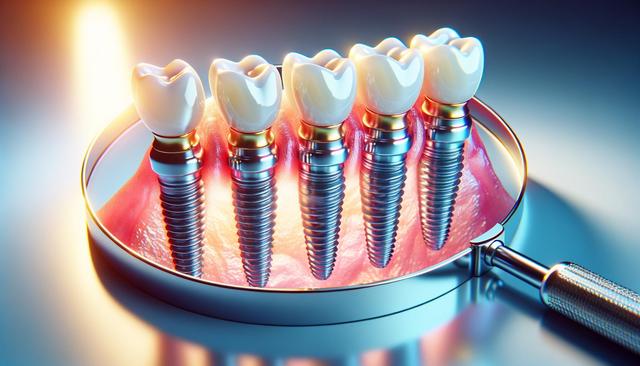
Dental Implants
Understanding What Dental Implants Are
Dental implants are artificial tooth roots made from biocompatible materials such as titanium. These roots are surgically placed into the jawbone to support replacement teeth like crowns, bridges, or dentures. Unlike removable dentures, implants are fixed in place and integrate with the bone over time through a process known as osseointegration. This creates a secure and durable foundation that mimics the function of natural teeth. The use of dental implants has become increasingly common due to their ability to restore both function and aesthetics with a high level of precision and reliability. Patients often turn to implants when they have lost teeth due to injury, decay, or periodontal disease.
Dental professionals evaluate several factors before recommending implants, including the patient’s bone density, oral health, and lifestyle habits. In some cases, bone grafting may be necessary if the jawbone lacks the required volume or strength to support the implant. Once the implant is placed and the healing process is complete, a customized prosthetic tooth is attached, offering a seamless fit and natural look. This process, while more time-intensive than traditional dentures, often results in a more stable and satisfying outcome for the patient.
Benefits of Choosing Dental Implants
Dental implants offer numerous advantages over other tooth replacement options. One of the primary benefits is their ability to preserve jawbone health. When a tooth is lost, the surrounding bone begins to deteriorate over time due to lack of stimulation. Implants help maintain bone structure by mimicking the function of natural tooth roots. This not only supports oral health but also maintains facial structure, reducing the appearance of sagging or premature aging.
Additional benefits of dental implants include:
- Improved speech and comfort compared to removable dentures
- Enhanced chewing efficiency and dietary choices
- Long-term durability with proper care
- Better oral hygiene since implants do not rely on adjacent teeth for support
Many patients also report heightened confidence and self-esteem following the procedure, particularly when the implant restorations are well-matched to their natural teeth. Because they are custom-designed, implants can be tailored to suit various aesthetic and functional needs, making them a versatile solution for a wide range of dental concerns.
The Procedure: What to Expect
The dental implant process typically involves multiple stages and requires collaboration between dental professionals such as oral surgeons, periodontists, and prosthodontists. Initially, a comprehensive examination is conducted, including X-rays or 3D imaging, to assess bone structure and plan the placement. Once the patient is deemed a suitable candidate, the surgical phase begins with the insertion of the implant into the jawbone under local anesthesia.
After placement, the implant site undergoes a healing period ranging from several weeks to a few months. During this time, the bone grows around the implant in a process called osseointegration. Once healing is complete, an abutment is attached, which serves as the connection between the implant and the replacement tooth. Finally, a custom crown, bridge, or denture is placed, completing the restoration.
While the timeline can vary depending on individual healing rates and additional procedures like bone grafting, most patients find the results well worth the investment of time. The final outcome is a secure, natural-looking tooth that functions similarly to a real one, often lasting many years with proper maintenance.
Maintenance and Long-Term Care
Maintaining dental implants is similar to caring for natural teeth. Regular brushing and flossing, along with routine dental checkups, are essential to prevent complications such as peri-implantitis, an inflammatory condition that can affect the soft and hard tissues around implants. Though implants are not susceptible to decay, the surrounding gum tissue must remain healthy to ensure long-term success.
Best practices for implant care include:
- Brushing twice daily with a soft-bristle toothbrush
- Using low-abrasive toothpaste to avoid damaging the implant surface
- Cleaning between implants and natural teeth with interdental brushes or floss
- Scheduling professional cleanings and exams every six months
Patients are also advised to avoid smoking and limit consumption of hard or sticky foods that could damage the prosthetic components. With diligent care, dental implants can last for decades, providing a reliable and aesthetically pleasing solution. Dental professionals may also recommend specific tools or techniques tailored to the patient’s individual needs to further enhance implant longevity.
Are Dental Implants Right for You?
Choosing dental implants involves several considerations, including health status, lifestyle, and personal preferences. Ideal candidates are non-smokers with healthy gums and sufficient bone density. However, even those with certain medical conditions or previous bone loss may still be eligible for implants after appropriate treatment or preparatory procedures. Consulting with a qualified dental professional is the first step in determining whether implants are a viable option.
It’s important to discuss:
- Medical history and current medications
- Oral health habits and previous dental treatments
- Expectations regarding appearance and functionality
- Financial considerations and insurance coverage
While the cost of dental implants may be higher than other options initially, many patients view them as a long-term investment in their health and quality of life. Their ability to provide stable, natural-looking results makes them a compelling choice for individuals seeking a permanent solution to tooth loss. Personalized care plans and flexible treatment options further support a wide range of needs and preferences.
Conclusion: Making an Informed Decision
Dental implants present a reliable and long-lasting solution for those looking to replace missing teeth with both function and aesthetics in mind. While the process involves a commitment of time and care, the outcome is often transformative, improving not just oral health but overall confidence and well-being. By understanding the procedure, benefits, and maintenance requirements, patients can make informed decisions that align with their unique needs. Working with a qualified dental professional ensures the best possible outcome and supports long-term success in restoring a healthy, complete smile.